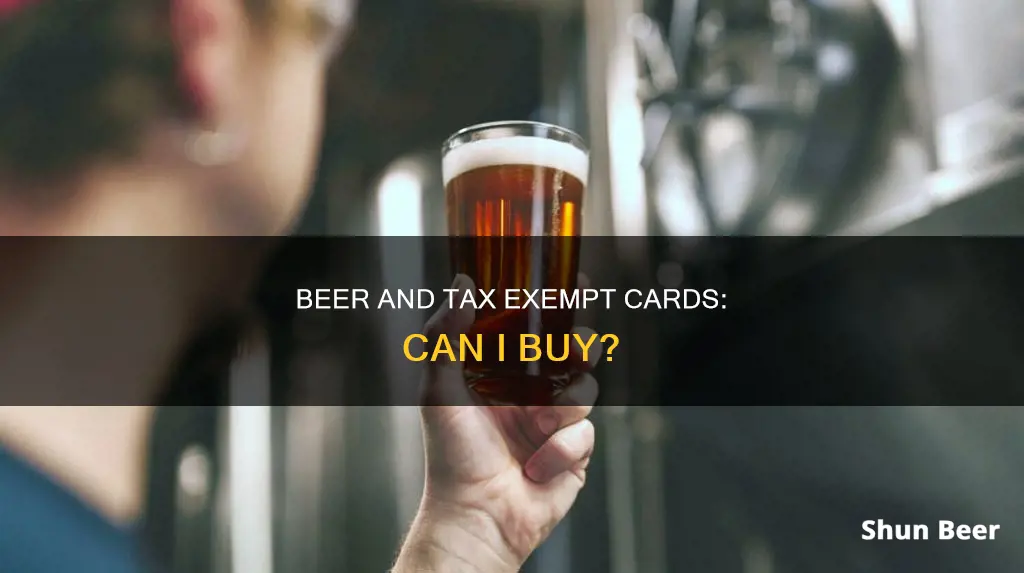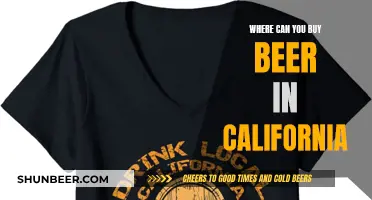
In Texas, the answer is yes, but only under certain circumstances. Beer is taxable under the state's Mixed Beverage Taxes, which apply to the sale of alcoholic beverages by a mixed beverage permittee for on-premises consumption. However, foreign diplomatic and consular personnel who present a Personal or Mission Tax Exemption Card issued by the U.S. Department of State are exempt from paying the mixed beverage sales tax, unless the exemption card specifically excludes purchasing alcoholic beverages. These exemption cards are issued by the Department's Office of Foreign Missions to eligible foreign missions and their members, based on international law and reciprocity. The level of tax exemption is set by the Office of Foreign Missions and may vary depending on the tax relief privileges enjoyed by U.S. missions and personnel in the foreign country.
What You'll Learn
- Foreign diplomatic and consular personnel are exempt from paying mixed beverage sales tax if they present a Personal or Mission Tax Exemption Card
- The exemption card must be presented at the time of payment and can be verified by the vendor online or by calling the Office of Foreign Missions
- The exemption does not apply to personal purchases by an employee of an exempt organisation, even if they are travelling on official business and will be reimbursed
- The exemption card may have different levels of tax exemption, which are described on the card
- The Office of Foreign Missions administers the foreign diplomatic program and provides resources for vendors to verify tax exemption cards

Foreign diplomatic and consular personnel are exempt from paying mixed beverage sales tax if they present a Personal or Mission Tax Exemption Card
The Office of Foreign Missions (OFM) issues diplomatic tax exemption cards to eligible foreign missions and their accredited members and dependents. These cards provide point-of-sale exemption from sales tax and other similarly imposed taxes throughout the United States.
There are two types of tax exemption cards: Mission Tax Exemption Cards and Personal Tax Exemption Cards. Mission Tax Exemption Cards are used by foreign missions to obtain exemption from sales and other taxes on purchases necessary for the mission's operations and functions. Personal Tax Exemption Cards are used by eligible foreign mission members and their dependents to obtain exemption from sales and other taxes on personal purchases.
The level of exemption authorised on the card is set by the OFM on the basis of reciprocity, determined by the tax relief privileges enjoyed by US missions and personnel in the foreign country. Some cards authorise an unrestricted exemption from sales taxes, while others authorise an exemption with some degree of restriction, such as a minimum purchase requirement or excluded categories.
It is important to note that not all foreign missions and their personnel are entitled to tax exemption. This privilege is based on reciprocity, and if the United States Embassy and Consular personnel do not receive equivalent privileges in a foreign country, then the foreign mission will not be granted tax exemption privileges in the United States.
Buying Beer at 18: Understanding the 3 Percent Rule
You may want to see also

The exemption card must be presented at the time of payment and can be verified by the vendor online or by calling the Office of Foreign Missions
The exemption card is a crucial document that facilitates tax relief for eligible foreign missions and their members. To utilize this benefit, it is essential to understand the specific procedures and requirements associated with its use. Here is a detailed overview of the key considerations regarding the presentation and verification of the exemption card:
Presentation of the Exemption Card:
- Timing: The exemption card must be presented at the time of payment. When making a purchase, the cardholder should ensure that they provide the card to the vendor before finalizing the transaction. This allows the vendor to apply the tax exemption to the sale.
- In-Person Requirement: The exemption card is designed for in-person transactions. Online or telephone purchases do not allow for the presentation of the card to the vendor, so the exemption cannot be honored in such cases.
Verification of the Exemption Card:
- Online Verification: Vendors can verify the validity of the exemption card online. This option provides a convenient and efficient way to confirm the card's authenticity and the purchaser's eligibility for tax exemption.
- Calling the Office of Foreign Missions (OFM): If online verification is not possible or if further assistance is needed, vendors can contact the OFM during business hours. They can verify the card's validity and provide any necessary guidance or clarification.
- Card Copy for Accounting and Reporting: To facilitate accurate record-keeping, vendors should retain a copy of both the front and back of the exemption card. This helps in accounting and reporting processes, ensuring compliance with tax regulations.
It is important to note that the exemption card should only be used by the individual identified and pictured on the card. It is non-transferable and cannot be loaned to another person, regardless of their eligibility status. By following these guidelines, cardholders and vendors can ensure the proper use and verification of the exemption card, enabling tax-exempt purchases as outlined by the OFM.
Beer Buying in North Carolina: Before Noon Laws
You may want to see also

The exemption does not apply to personal purchases by an employee of an exempt organisation, even if they are travelling on official business and will be reimbursed
The exemption described does not apply to personal purchases made by an employee of an exempt organisation, even if they are travelling on official business and will be reimbursed. This means that if an employee of an exempt organisation uses their tax-exempt card to purchase beer, they will not be exempt from paying tax on that purchase, even if they are on official business and will be reimbursed by their organisation. This is true even if the exempt organisation has been granted a charitable, religious, or educational exemption from taxes.
In the context of Texas state law, a "personal purchase" is defined as a purchase that does not relate to the exempt organisation's purpose. For example, beer, wine, and liquor purchases do not usually qualify for exemption because they are not part of the exempt organisation's purpose. On the other hand, an exempt religious organisation can claim an exemption when it buys sacramental wine, as this purchase would be related to the organisation's purpose.
It is important to note that the rules and regulations regarding tax exemptions may vary depending on the state or country. The information provided here specifically pertains to Texas state law and may not apply in other jurisdictions.
Buying Beer at Michigan Stadium: What's the Deal?
You may want to see also

The exemption card may have different levels of tax exemption, which are described on the card
- Owl: This card is for mission tax exemption with no restriction.
- Buffalo: This card is for mission tax exemption with some degree of restriction.
- Eagle: This card is for personal tax exemption with no restriction.
- Deer: This card is for personal tax exemption with some degree of restriction.
The type of exemption card held by an individual will determine the extent of their tax exemption privileges. The level of exemption is set by the Department's Office of Foreign Missions (OFM) based on reciprocity and the tax relief privileges enjoyed by US missions and personnel in the foreign country.
For example, the "Owl" card provides unrestricted exemption from sales taxes, while the "Buffalo" card may have restrictions such as a minimum purchase requirement or excluded categories. It is important to carefully review the details of the exemption card to understand the specific tax exemption privileges it confers.
Buying Beer at Virginia Gas Stations: What's the Deal?
You may want to see also

The Office of Foreign Missions administers the foreign diplomatic program and provides resources for vendors to verify tax exemption cards
The Office of Foreign Missions (OFM) was established in 1982 by the Foreign Missions Act, 22 U.S.C. 4301-4316. The office serves the foreign diplomatic and consular communities stationed in the United States and controls their activities. The Diplomatic Tax Exemption Program is one of the responsibilities of the OFM. This program provides sales and use, occupancy, food, airline, gas, and utility tax exemptions to eligible foreign officials on assignment in the United States.
The Department of State's Office of Foreign Missions (OFM) issues diplomatic tax exemption cards to eligible foreign missions and their members and dependents. These cards are issued based on international law, reciprocity, and treaties. They allow the US to honour its host country obligations under the Vienna Convention on Diplomatic Relations (VCDR) and Vienna Convention on Consular Relations (VCCR).
The cards provide point-of-sale exemption from sales tax and other similar taxes in the United States. When making a purchase, the cardholder must present the card to the vendor in person. The vendor can verify the card's validity online or by calling the OFM during business hours. They should also retain a copy of the front and back of the card for accounting and reporting purposes.
There are two types of diplomatic tax exemption cards: Mission Tax Exemption Cards and Personal Tax Exemption Cards. Mission Tax Exemption Cards are used by foreign missions to obtain exemption from sales and other taxes on purchases necessary for the mission's operations. These purchases must be made with a check, credit card, or wire transfer in the name of the foreign mission. Personal Tax Exemption Cards are used by eligible foreign mission members and their dependents for exemption from sales and other taxes on personal purchases. This card is non-transferable and must be used solely for the benefit of the individual identified on the card.
The Office of Foreign Missions also administers the foreign diplomatic program and provides resources for vendors to verify tax exemption cards. Vendors can verify the validity of a diplomatic tax exemption card online or by contacting the OFM. They should also retain a copy of the card for their records.
The Office of Foreign Missions provides detailed information on its website about the diplomatic tax exemption program, including the types of purchases permitted and not permitted with the tax exemption cards. The website also includes contact information for the OFM's regional offices in New York, Miami, Chicago, Houston, San Francisco, and Los Angeles.
Iron City Beer: Where to Buy and Enjoy It
You may want to see also
Frequently asked questions
It depends on the type of tax-exempt card you have. If you are a foreign diplomatic or consular personnel, you can use your Personal or Mission Tax Exemption Card issued by the U.S. Department of State to buy beer tax-free. However, if your exemption card specifically excludes purchasing alcoholic beverages, then you cannot use it to buy beer.
A tax-exempt card is issued by the U.S. Department of State's Office of Foreign Missions (OFM) to eligible foreign missions and their members. It allows them to be exempt from paying certain taxes, including sales tax, when making purchases in the United States.
Foreign missions and their accredited members and dependents are eligible for tax-exempt cards. This includes individuals who are neither U.S. nationals nor permanently resident in the United States, such as diplomatic agents, members of the administrative and technical staff, consular officers, and consular employees.
When making a purchase, you must present your tax-exempt card to the vendor in person. The vendor may verify the card's validity online or by contacting the OFM during business hours. They should also retain a copy of the front and back of the card for their records.







